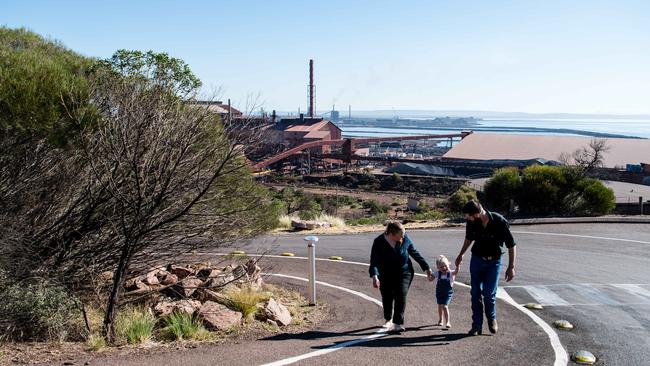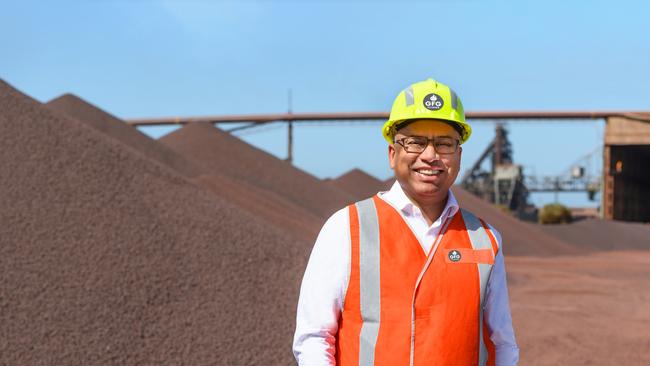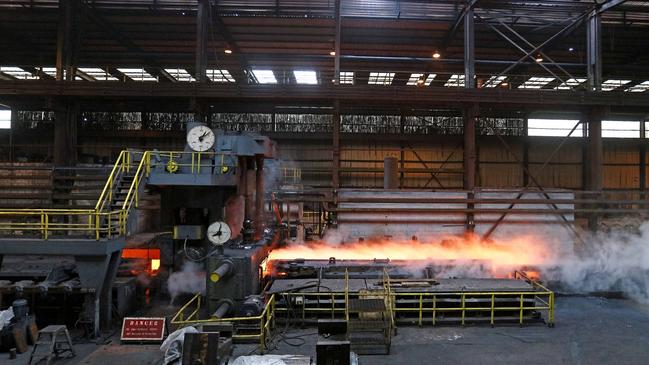UK mulls nationalising Sanjeev Gupta’s steel assets after rejecting bailout
Britain is considering nationalising parts of Sanjeev Gupta’s steel empire, while Australia refuses to speculate on the British industrialist’s finances.

The UK government is considering nationalising parts of Sanjeev Gupta’s steel empire after it rejected the British industrialist’s plea for a £170m ($307m) rescue package, while the Morrison government refuses to speculate on the health of Mr Gupta’s finances.
Mr Gupta, which bought the Whyalla steelworks from administration in 2017, has been engaging in “an intense amount of discussion with governments around the world” to help prop up the empire he founded eight years ago.
But British Business Secretary Kwasi Kwarteng said that while Mr Gupta’s Liberty Steel was a “national asset” the government could not pump money into “a black box”.
Mr Kwarteng called the structure of Liberty’s owner — Gupta Family Group (GFG) — “very opaque” and “not helpful”.
“We are custodians of taxpayer’s money ... and we feel that if we gave the (£170m) money, there was no guarantee that the money would stay in the UK and would protect British jobs,” he told the BBC.
Mr Kwarteng’s comments come as fears grow about the future of GFG and Liberty Steel, which together employ around 5000 people domestically and 35,000 worldwide, including in Australia.

But Mr Kwarteng said “all options” were being considered to save Liberty Steel’s UK plants and jobs, including nationalisation. “We think that the steel industry has a future in the UK.”
His comments echo key Australian crossbench Senator Rex Patrick, who has argued that while Australia needs a steel industry, taxpayer money should not be injected into Mr Gupta’s group, which, if financially unstable, should be let to fall into administration.
“You cannot inject taxpayers money into that organisation given the uncertainty that surrounds it. A better option might be to let the facility fall into administration and then the Commonwealth can take a much more active role,” Mr Patrick said.
Industry Minister Karen Andrews had been saying the same thing over the past month when asked about Greensill Capital’s collapse and GFG.
“It would not be appropriate for the government to speculate about the finances of a private company,” Ms Andrews said on Sunday.
“However, we are closely monitoring the situation, and working across government, given the value of the Whyalla Steelworks to the broader community, not just its direct employees.”
Mr Gupta’s pleas for government support came as he continued to announce a standstill on a $US5bn loan with the administrators of collapsed financier Greensill Capital.
It was Greensill Capital that fuelled Mr Gupta’s expansion plans — which included buying poor-performing plants, which he said were “either closed, closing, or on (their) last legs” — after he struggled to gain access to mainstream finance.

Mr Gupta said Greensill’s finance involved advancing GFG money on future sales it “may make” and had played a role in helping GFG access government support.
“Greensill was our conduit to try and apply for many of these government-backed guarantees for COVID interruptions. Unfortunately in the middle of that they collapsed,” Mr Gupta said on a podcast to employees.
“What I can say is that whatever money we receive from them, from these guarantees we use for the purpose of the businesses.
“Ever since this episode started I’ve honestly had an intense amount of discussion with governments around the world. Our businesses and the number of people and communities it supports is very important.”
Since Greensill’s collapse, GFG has had difficulty securing refinancing, even though the group says it has sufficient funds for its current needs.
Mr Gupta said any breakthrough “will take some time”.
“It’s been the most difficult month of my life.”
In the meantime, he was “personally monitoring” cash conservation initiatives across each of GFG plants.
Asked whether the initiatives would include redundancies or reduced hours, Mr Gupta he would do “whatever it takes and whatever is right by them as best as we can”.
“We have saved many plants. And each and every one of them would not have got through it was either closed, closing, or on its last legs. So I’m first of all incredibly proud of what we’ve done.
“Some are still in the process of being turned around. Some unfortunately, were basically turned around but have been hit by unforeseen events and Brexit was first.
“As always, in that journey, my people will always come first. So we will do whatever it takes, and whatever is right by them as best as we can.”
ADDITIONAL REPORTING: AFP






To join the conversation, please log in. Don't have an account? Register
Join the conversation, you are commenting as Logout